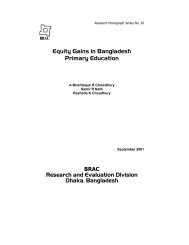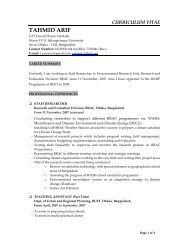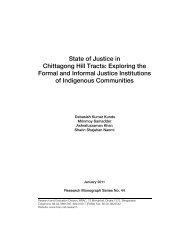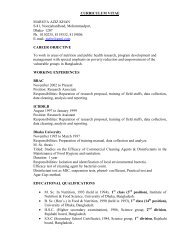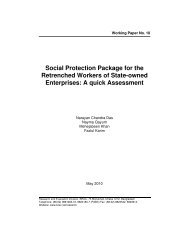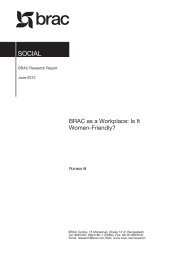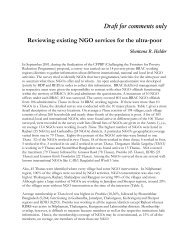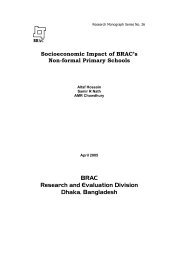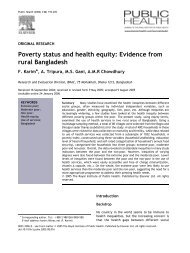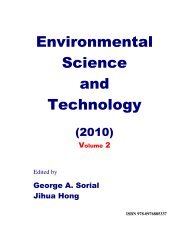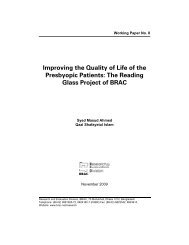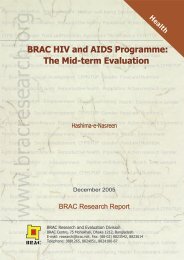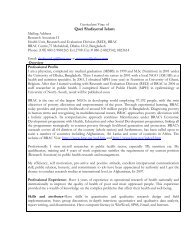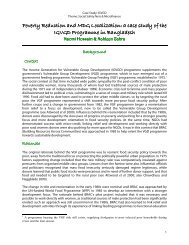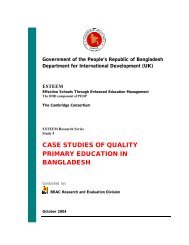Combining health and social protection measures to reach the ultra ...
Combining health and social protection measures to reach the ultra ...
Combining health and social protection measures to reach the ultra ...
You also want an ePaper? Increase the reach of your titles
YUMPU automatically turns print PDFs into web optimized ePapers that Google loves.
Access <strong>to</strong> <strong>health</strong><br />
Open access <strong>to</strong> research pro<strong>to</strong>cols<br />
<strong>and</strong> results: intellectual property<br />
<strong>and</strong> <strong>the</strong> right <strong>to</strong> <strong>health</strong><br />
Article by Rodrigo A Salinas<br />
The human right <strong>to</strong> <strong>the</strong> highest attainable st<strong>and</strong>ard of<br />
<strong>health</strong> requires for its fulfilment access <strong>to</strong> good quality<br />
<strong>health</strong> care. Equitable access <strong>to</strong> <strong>health</strong> technologies,<br />
ranging from <strong>health</strong> promotion activities <strong>to</strong> drugs <strong>and</strong> complex<br />
interventions, is a key part of <strong>the</strong> care provided. An equally<br />
important requirement for ensuring good quality care,<br />
however, is access <strong>to</strong> information on <strong>the</strong> efficacy <strong>and</strong> safety<br />
of <strong>the</strong>se technologies, coming from scientific research. Any<br />
barrier hampering access <strong>to</strong> this information should be<br />
considered as dangerous as those barriers preventing access<br />
<strong>to</strong> drugs <strong>and</strong> o<strong>the</strong>r <strong>health</strong> technologies. The Doha Declaration<br />
recognized in 2001 that trade-related intellectual property<br />
rights should not conflict with <strong>the</strong> right <strong>to</strong> protect public<br />
<strong>health</strong>. Conflict among <strong>the</strong>se rights, however, affects not only<br />
access <strong>to</strong> drugs, as emphasized by those mechanisms<br />
created <strong>to</strong> implement <strong>the</strong> Declaration, but also access <strong>to</strong> <strong>the</strong><br />
information on <strong>the</strong> efficacy <strong>and</strong> safety of <strong>the</strong>se drugs,<br />
particularly by those provisions contained in article 39.3 of<br />
<strong>the</strong> Trade-Related Aspects of Intellectual Property Rights<br />
(TRIPS) Agreement that reward <strong>the</strong> non-disclosure of <strong>the</strong><br />
findings of medical research.<br />
The right <strong>to</strong> <strong>the</strong> highest attainable st<strong>and</strong>ard of <strong>health</strong> has<br />
been recognized as a human right in <strong>the</strong> International<br />
Covenant on Economic, Social <strong>and</strong> Cultural Rights, adopted<br />
<strong>and</strong> opened for signature <strong>and</strong> ratification by <strong>the</strong> General<br />
Assembly of <strong>the</strong> United Nations (UN) in December 1966. In<br />
a general comment issued by <strong>the</strong> Economic <strong>and</strong> Social<br />
Council of <strong>the</strong> UN in 2000, it is explicitly stated that a<br />
substantive issue arising in <strong>the</strong> implementation of this right is<br />
<strong>the</strong> provision of equal <strong>and</strong> timely access <strong>to</strong> basic preventive,<br />
curative, rehabilitative <strong>health</strong> services, regular screening<br />
programmes <strong>and</strong> appropriate treatment of prevalent diseases<br />
<strong>and</strong> disabilities.<br />
The new global deal on intellectual property rights, arising<br />
out of <strong>the</strong> Uruguay Round of Multilateral Trade Negotiations<br />
that concluded with <strong>the</strong> signature of <strong>the</strong> Agreement on TRIPS,<br />
<strong>and</strong> <strong>the</strong> creation of <strong>the</strong> World Trade Organization (WTO), in<br />
<strong>the</strong> eighties, has been denounced in many forums as a barrier<br />
for fulfilling this right. The current system of granting patents<br />
for new drugs, considered as crucial for encouraging <strong>the</strong><br />
invention of much-needed medicines by <strong>the</strong> pharmaceutical<br />
industry, has been considered as an obstacle for getting<br />
equitable access <strong>to</strong> drugs in developing countries 1 . These<br />
concerns <strong>and</strong> a couple of much publicized cases, such as <strong>the</strong><br />
case brought against President Nelson M<strong>and</strong>ela by <strong>the</strong> South<br />
African Pharmaceutical Manufacturers Association,<br />
eventually led <strong>the</strong> WTO <strong>to</strong> produce <strong>the</strong> Doha Declaration on<br />
<strong>the</strong> TRIPS Agreement <strong>and</strong> Public Health recognizing that:<br />
“…<strong>the</strong> Agreement can <strong>and</strong> should be interpreted <strong>and</strong><br />
implemented in a manner supportive of WTO members’ right<br />
<strong>to</strong> protect public <strong>health</strong> <strong>and</strong>, in particular, <strong>to</strong> promote access<br />
<strong>to</strong> medicines for all” 2 .<br />
Ensuring access <strong>to</strong> drugs, notwithst<strong>and</strong>ing, is only one<br />
among o<strong>the</strong>r requirements needed for fulfilling <strong>the</strong> right <strong>to</strong><br />
good quality <strong>health</strong> care. A much less explored, but equally<br />
important domain is <strong>the</strong> need for ensuring access <strong>to</strong><br />
information on <strong>the</strong> efficacy <strong>and</strong> safety of drugs. Health care,<br />
in order <strong>to</strong> achieve <strong>the</strong> desirable outcomes it is supposed <strong>to</strong><br />
get, needs not only careful use of technologies that are<br />
applied by <strong>health</strong> professionals, <strong>and</strong> provided by <strong>health</strong><br />
services, but needs also a responsible <strong>and</strong> accountable<br />
decision-making process leading <strong>to</strong> <strong>the</strong> prescription of a<br />
particular procedure for a particular person. This decisionmaking<br />
process, <strong>to</strong> be considered a high quality one, needs<br />
timely access <strong>to</strong> adequate <strong>and</strong> appropriate information on <strong>the</strong><br />
safety, efficacy <strong>and</strong> effectiveness of <strong>the</strong> whole menu of<br />
technologies that are available <strong>to</strong> be prescribed for different<br />
conditions. Good quality information on <strong>the</strong>se domains<br />
comes, in medicine, from methodologically sound <strong>and</strong><br />
ethically responsible research. It is reasonable, thus, <strong>to</strong><br />
conclude, that <strong>the</strong> materialization of access <strong>to</strong> <strong>health</strong> care as<br />
a human right, needs not only actual access <strong>to</strong> technologies<br />
but also adequate <strong>and</strong> timely access <strong>to</strong> information on those<br />
domains that allow appropriate decisions <strong>to</strong> be made at <strong>the</strong><br />
points where <strong>the</strong>se decisions occur.<br />
Practising medicine <strong>and</strong> allied <strong>health</strong> professions in <strong>the</strong><br />
21st century, would be unthinkable without access <strong>to</strong> good<br />
quality data on <strong>the</strong> efficacy, effectiveness, <strong>and</strong> safety of <strong>health</strong><br />
technologies, ranging from <strong>health</strong> promotion activities <strong>to</strong><br />
highly sophisticated medical devices. As part of this move<br />
<strong>to</strong>wards explicit use of scientific data, evidence-based<br />
medicine has been widely accepted as a new paradigm for<br />
teaching <strong>and</strong> practising medicine, de-emphasizing intuition,<br />
unsystematic clinical experience <strong>and</strong> pathophysiologic<br />
rationale as sufficient grounds for decision-making 3 , <strong>and</strong><br />
Global Forum Update on Research for Health Volume 4 ✜ 047



